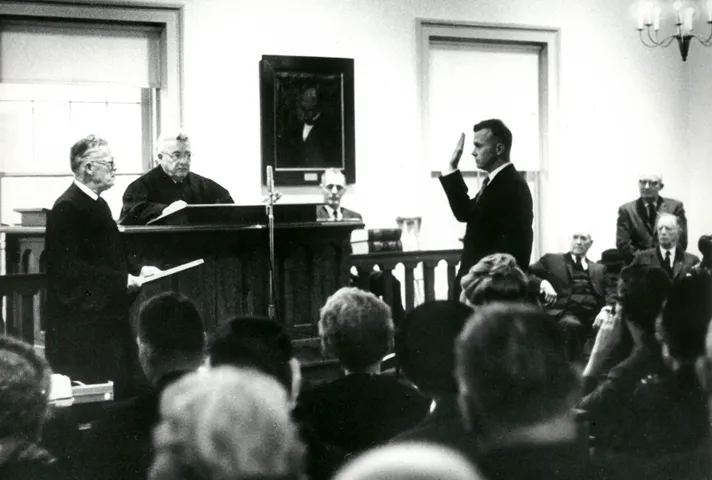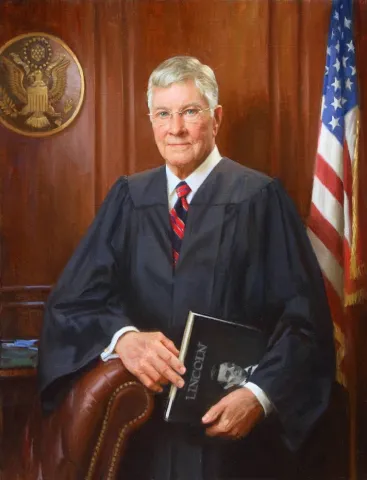
Judge Richard Mills is sworn in as an Illinois circuit judge on December 5, 1966.
When Richard Mills was first sworn in as a judge, the war dominating headlines was Vietnam, the price of a gallon of gas was 32 cents, and man had yet to set foot on the moon. And, Mills recalls, court reporters took notes with pencils and pads.
The day was December 5, 1966, and Mills was embarking on what would turn out to be a 50-year “marvelous adventure,” first as an Illinois circuit judge and then as a U.S. district judge. His swearing-in took place in the “Lincoln Courtroom” in Beardstown, Illinois, where Abraham Lincoln once famously used “The Old Farmer’s Almanac” to convince a jury that a witness could not have possibly identified his client by the light of the moon. Mills also cut his teeth in the courtroom, prosecuting cases as the Cass County state’s attorney.
Longevity is not uncommon in the Judiciary, but celebrating the half-century mark is still remarkable. Mills also hails from a family with long lineage in the law: His father, Myron Mills, was the Cass County state’s attorney from 1924 to 1932, and his grandfather opened a law practice in Cass County 1870, five years after the close of the Civil War.
As a state judge, Judge Mills rode the circuit for 10 years, presiding in all eight counties of Illlinois’ 8th Circuit. He was elected to the state’s Appellate Court, where he served for nine years and participated in hundreds of opinions before attracting the notice of President Reagan.

U.S. District Court Judge Richard Mills
In 1985, the president appointed Mills as a U.S. judge for the Central District of Illinois, where he continues to sit as a senior judge. In his 31 years on the federal bench, Mills has presided over scores of civil and criminal cases, including one involving the notorious El Rukn street gang, a set of related court cases that sent more than 50 members of the violent drug organization to prison in the early 1990s, many of them on murder and racketeering charges.
“There were at least 24 U.S. Marshals in the courtroom, and I selected an anonymous jury, so that no one knew who the jurors were, not even the jurors,” Mills recalled of the tight security necessitated by the gang’s reputation for violence and retaliation.
While sitting in on appellate cases, one of his most memorable was a major water rights battle among the states of Georgia, Florida and Alabama that he heard as part of an 11th Circuit panel in Atlanta. The complex and politically charged case was closely watched by local and state officials, major businesses in the states, and the media. It unfolded in a “courtroom packed to the gills,” Mills said. “It was a real barn burner.”
Mills was born in Beardstown in 1929, and graduated from Illinois College, where he was a varsity debater and orator. During the Korean War, he served with the 3rd Infantry Division in Korea, earning the Bronze Star. He got a law degree from Mercer University and then joined his grandfather’s law practice. He later earned a postgraduate law degree from the University of Virginia. Mills served as a public defender and the Cass County state’s attorney, and was then elected as a state circuit judge.
“This is my life. I don’t want to do anything else,” Mills said. “It’s just been a great adventure and a great experience. … You think you’ve got an old law that you know everything there is to know, and some ingenious lawyer comes along to bring it back to you with a new twist, and it’s marvelous. It’s absolutely fascinating and it changes every day.”
But it hasn’t all been hard toil in the judicial vineyard. Over the years, Mills has traveled to every continent except Antarctica. Not to worry, he has a trip scheduled there in February.
Subscribe to News Updates
Subscribe to be notified when the news section is updated.
